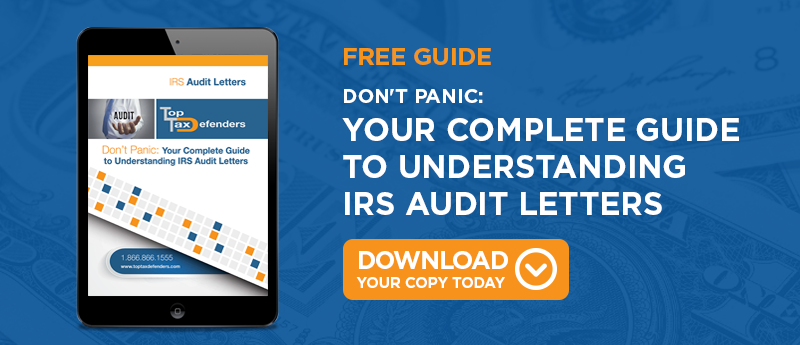
Oh, no! It’s a letter from the IRS talking about an audit — hide!
No, don't hide. Resist the urge to lock all the doors and tremble under the covers because an audit notification really doesn't mean what you think it means. The IRS isn't auditing you because they suspect you of criminal activity. (You have behaved, haven’t you?)
Most of the time, you get an audit notice because you were picked by an algorithm to have one. The selection is based on statistics and a comparison of your return against the “norm.” You could get picked due to a math error or because you were lucky and made a huge bonus last year.
The thing is, if you need to fight an IRS audit, you might not need to put on those boxing gloves just yet. Let’s look into it, shall we?
Why Does the IRS Audit You (or Anyone)?
Most of the time, the IRS sends an audit notice based on random selection and computer screening. That algorithm mentioned above? Yeah, the IRS runs returns through that algorithm just like a manufacturer runs completed products through a quality assurance process. So many are kicked out just to check everything is going OK.
Also, if a return doesn't match the norms for other similar returns, the IRS might take a closer look and decide to audit you. Another chance for audit occurs if your return includes transactions with other taxpayers, such as business partners or investors, who were audited. Income differences and unusual deductions can cause your return to be flagged for an audit.
Other reasons for an IRS audit include:
- Home office deductions
- Conflicting third-party income reports like 1099s or W-2s
- Business use of a vehicle
- Rental losses
- Foreign currency transactions or bank accounts
- Hobby-related deductions (hobby losses)
None of these reasons show blatant disregard for the tax law, but they are common areas for fraud or exaggeration.
The IRS has three years from the due date of the return to initiate an audit, and the agency starts most audits within a year of filing. Most are completed within a year.
Types of Audits
The IRS has three ways to audit.
A correspondent audit is also called a mail audit. You and the IRS go back and forth a couple of times via the US Postal Service, and everything is fixed. Correspondence audits generally include routine math errors or missing documentation.
An office examination audit is held at the local IRS branch office. It’s a little more stressful because you have to actually speak with an agent who is trying to determine if you reported all your income and only asked for legitimate deductions. You can feel put on the spot, but most of the time, everything is fine.
A field audit is the most extensive type of audit. The IRS chooses to expend resources to send an agent to your home, business, or accountant’s office to examine your records and files. The agency wants to confirm the information on your return is correct while you sweat it out.
Preparing for an Audit
First, understand the IRS contacts people by phone or mail, never by email. Generally, you receive a notification of an audit in the postal mail, including the specific information the IRS wants to examine.
The letter contains a list of supplementary documents you might need to present. The agency gives you a couple of weeks to get everything together. You have 30 days to respond, but don't wait. Waiting allows the interest to grow on any unpaid balance you have.
Quickly gather and organize the forms requested by the IRS. Get copies, not the originals. If you misplaced anything, call immediately for a duplicate. Begin gathering early in case you need time to dig anything out.
What could the IRS ask for?
- Home mortgage statements
- Receipts
- Previous tax returns
- Brokerage statements
- Retirement account records
- Pay stubs
The IRS wants to see any document supporting your tax return figures. That's why you save everything once you file. You never know if you're going to need it.
Understand the Scope of the Audit
As you prepare, be sure you understand the reason for the audit. You don’t want to offer anything the IRS didn’t ask for.
Mail audits are typically limited to a few items, while office and field audits are more extensive. In that case, prepare to answer in-depth questions about your finances and activities.
You should call your tax professional to help you review your documents for anything more than a correspondence audit. Online filing services may offer audit defense services for a fee. Also, you can obtain a licensed tax professional to represent you, such as a CPA, tax attorney, or IRS Enrolled Agent.
During the Audit
You can do this by yourself or have a representative either at your side or representing you without your presence.
Be polite and comply with the agent’s requests. Only show the documents requested and don’t volunteer anything.
Bring the following to your appointment:
- A copy of the audit notification letter
- Copies of the documents requested in the letter
- A copy of the tax return in question
- Copies of returns for two years previous to the return in question
- Copy of the most recent return if that is not the one under audit
- Copies of any documentation supplied to your tax preparer
- Copies of any documents showing the results of prior audits
- A copy of any other IRS letter or notice you received for the tax year in question
Now, keep your Zen while the agent rifles through your things.
Potential Outcomes
An audit has three potential outcomes:
- No changes
- Agreed upon change
- Change the taxpayer disagrees with and appeals
The first two are straightforward. The third requires you to take things further.
First, you don’t have to sign the report right away. You can ask to speak with the agent’s supervisor for further review. You can then appeal the decision after the supervisor’s review all the way to court, if necessary.
You can also ask for assistance from the Taxpayer Advocate Service at this time. Meanwhile, your unpaid tax balance accrues interest from the original return date until you pay it. The interest compounds daily, and you could also face penalties.
Protect Yourself in Case of Audit
However small, there is always a chance that you will be tagged for an audit. Protect yourself by keeping tax returns and records for at least three years. Save your checkbook registers and organize receipts for major purchases by date. File your bills in folders and create a journal to keep evidence of deductible information.
Keep all your tax documents in one location for easy access. If you receive a notification from the IRS, you are ready for an audit. Engage your tax professional or Top Tax Defenders to help you.




